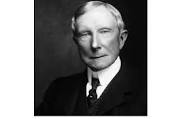
Advertisement
“In our dreams, people yield themselves with perfect docility to our molding hands. The present education conventions of intellectual and character education fade from their minds, and, unhampered by tradition, we work our own good will upon a grateful and responsive folk.We shall not try to make these people, or any of their children, into philosophers, or men of science. We have not to raise up from them authors, educators, poets or men of letters. We shall not search for great artists, painters, musicians nor lawyers, doctors, preachers, politicians, statesmen — of whom we have an ample supply. The task is simple. We will organize children and teach them in a perfect way the things their fathers and mothers are doing in an imperfect way.” John D. Rockefeller
More and more we are hearing the term “teaching to the test” in our educational system. The term refers to a method of instruction called competency based education, and it is a driving force behind many of our career readiness programs in formal education. Competency based education is driving the standard in the way your children are learning in school. Kids are no longer encouraged to learn through thinking and experience, or demonstrate problem solving abilities based on a sound, reasonable thought process. Instead, they are being trained to meet certain levels of “competency.” These so called competencies are not based on a traditional educational standard, but rather off of the input of industrial leaders who are in need of a compliant, productive workforce. In other words, our education system is now comparable to the old Soviet Union where people were simply trained to do a job. As technology advances it is likely certain jobs will be selected for certain individuals based on whatever information is collected through data mining. Most people will initially fail to see the problem with this as it is generally believed that being “job ready” is essential in today’s’ society. While this may be true on some levels, it doesn’t change the intent behind competency based education.

There is an article entitled “What is Competency Based Education?” written by one of its proponents, Dr. Robert Mendenhall. Dr. Mendenhall is apparently one of those elite who think he knows better than the rest of us concerning our education and abilities to learn. Arguing for competency based education he says,
“The fundamental premise of competency based education is that we define what students should know and be able to do, and they graduate when they have demonstrated their competency. This means we have to define the competency very clearly. Getting industry input is essential to ensure we have identified relevant competencies.” (Dr. Robert Mendenhall)
There are several problems with competency based education that are relevant here. One is the removal of honest standards. When industry is defining competency there is no “set” standard on what defines it means. It is different based on whatever job training program your children may be involved in. Who decides which children are competent for what programs? Who decides, and based on what criteria, which children are demonstrating leadership competencies? Who’s to say that meeting the competency isn’t limiting the Childs true abilities? On the other hand, when there is an educational standard in place there is a clear defined goal of what constitutes an educated individual. When a person is properly educated they are able to think freely and problem solve. When a person is trained to the test they are able to perform certain job functions, and in many cases, nothing more. Taking this approach in education leaves a person dependent on the system to go back and “retrain” in the event his previous training has not benefitted him. In other words, a person who has received a classical education is able to adapt to opportunities and think his way through the world. Competency based education is creating a world where people only know how to do the job they were trained to do.
In order to understand the roots of today’s educational system, you have to understand that it is based on the Marxist/Darwinist worldview. The school system became a social experiment where Pavlov’s stimulus response theories were applied to children in order to mold them to the social controllers liking. In other words, education was used to create a compliant population that would simply go along to get along.
Let’s examine the original definition of education as opposed to the “social scientists” definition. These definitions go back to the early twentieth century when European Socialism was first making its ways to our shores.
The New Century Dictionary of the English Language, Published in New York in 1927 defines education as follows-
“The drawing out of a person’s innate talents and abilities by imparting the knowledge of languages, scientific reasoning, history, literature, rhetoric, etc.—the channels through which those abilities would flourish and serve.”
This sounds like education was originally intended to create free independent thinkers of human beings and allow them to use their own talents and merits to strive for achievement.
The definition of education was radically altered as the influences of Marxist/Humanist social science became more relevant. Viewing the learning process from the narrow lens of “physiological processes” it became very dehumanizing as people came to be viewed as simply a body and a nervous system devoid of a soul. Social Psychologist Wilhelm Wundt wrote in his book in 1874 “The Principle of Physiological Psychology” the new “revised” definition of education.
“Learning is the result of modifiability in the paths of neural conduction. Explanations of even such forms of learning as abstraction, and generalization demand of the neurons only growth, excitability, conductivity, and modifiability. The mind is the connection-system of man; and learning is the process of connecting. The situation-response formula is adequate to cover learning of any sort, and the really influential factors in learning are readiness of the neurons, sequence in time, belongingness, and satisfying consequences.”
Based on this definition of education it is clear that our school systems are being used to condition people to be compliant workers. The corporate elite and government for that matter are only interested in training a workforce that will follow their directives, not be leaders. As social science continues to become masters of the human domain, education will continue to be dumbed down to the point where questioning authority will not even be possible because people will be trapped in their conditioned state.
Submit a correction >>
This article may contain statements that reflect the opinion of the author
Advertisement
Advertisements

















